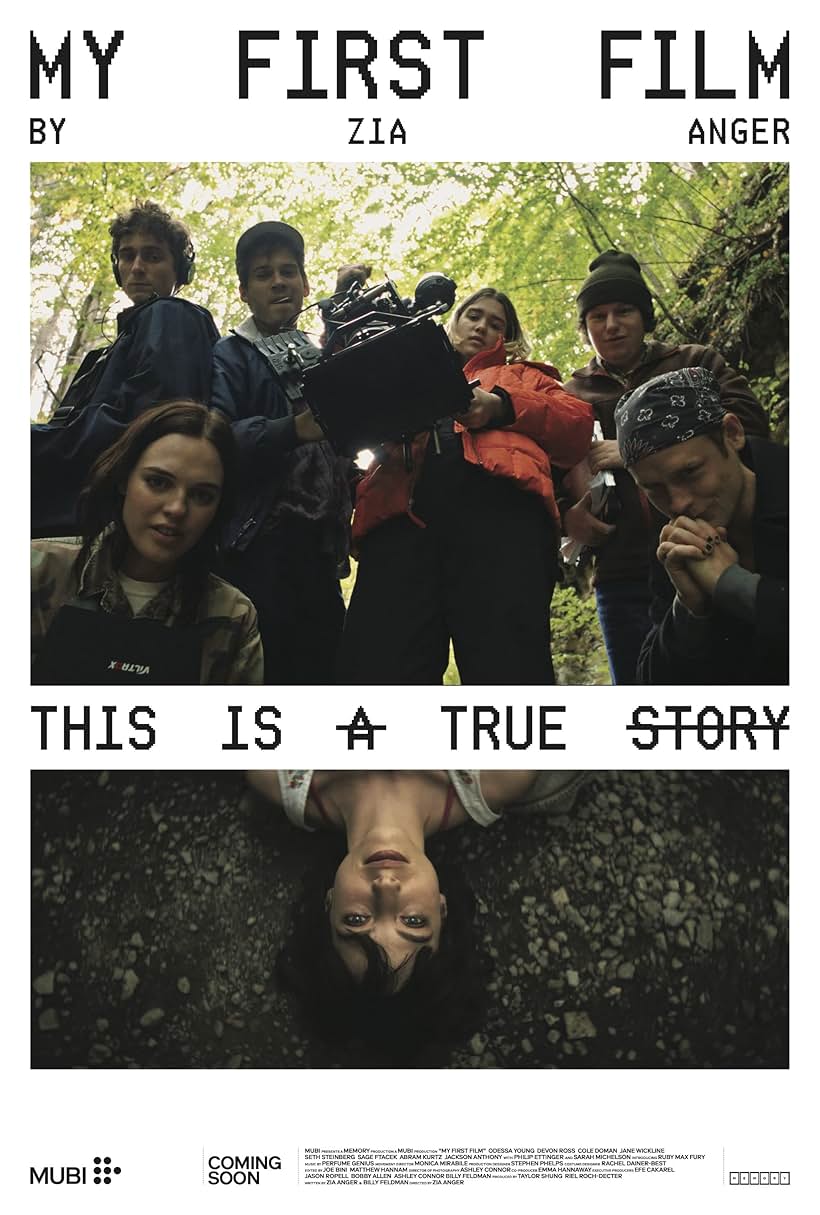
- Starring
- Odessa Young, Devon Ross, Cole Doman
- Writers
- Zia Anger, Billy Feldman
- Director
- Zia Anger
- Rating
- n/a
- Running Time
- 100 minutes
- Release Date
- September 6th, 2024 (Mubi)
Overall Score
Rating Summary
Within the first fifteen minutes of My First Film, audiences are treated to a compilation of different artistic expressions. The film then presents Vita (Young), a woman writing a note introducing her latest film but is still determining where to start. Featuring videos of a woman with gigantic balloon-shaped breasts or a duel with herself, they set the tone for a kinetic introduction. Jump cuts further tease audiences about the many challenges she faced. A young, creative mind lost among her enormous amount of ideas, she was the the main driving force of the plot. Preparing for a pitch to make a paid video about feminine help entitled ‘Female Trouble,’ Vita offers up a sketch of a uterus motion during the period. Her mother stars as the model for the uterus, while the other is an assistant.
Through this, the film offers insight into the functioning of Vita’s brain and her insecurities. The company receiving her pitch denies her pitch and suggests another idea for her first film for which she writes down before telling audiences that there is a first film. Jumping back twelve years, the film shifts from experimenting with multiple ideas to a “conventional” storyline, following the dramatic bits found in writing textbooks. However, Anger’s directing and writing denies conventions. So does Vita, a fictional representation of the director. Vita wants to escape the social norms associated with women, as they are expected to become mothers. Vita’s film is entirely a meta piece upon the escapade of a small town and from pregnancy, just like her own life. Her main character is looking for her mother, who abandoned her, which is not the case for her; she has two mothers and a father.
The non-conformity of how she was raised, her parents were in a commune in their town, and dealing with her father’s HIV diagnosis taught her not to follow social etiquette. In an ocean of meta language and constant references to her work, the director tries to tie the film to her real life. She chose not to be a mother and the film repeats this in multiple ways to emphasize that fact. This aspect of the narrative structure makes leads the film to circle back around the same topic. It needs to state what was already said to stay relevant to audiences. Providing some social commentary, it thrives in discussing the role of abortion and how it can free women from the chains of familiar positions that society requires them to.
Meanwhile, the multiple plotlines do not connect audiences with the film’s other characters. Rather, it is a centered journey on a character that leads to repetition. Young is competent in transmitting the agony of an undesired pregnancy and the madness of rejection, creation, and power. Vita goes on a path of losing herself in the direction of duties and crashes into the blockage of humanity. When she loses her ability to deal with others, the film will also lose audiences. She becomes an unbearable character with motivations that are difficult to understand. The other characters representing Vita’s film crew, however, lack much in the way of depth.
Even though the film’s creative madness is a clever construction, it feels loose due to its necessity to be meta in all moments. Also, its script essentially gets stuck within its gimmick. Trying to bring audiences closer to the story, the film turns to voiceover which works sometimes but in the end, My First Film falls into a therapy territory that appears too self-centered to let anyone in. It presents a lucid evaluation of filmmaking, but it is too impressed with its format that it becomes addicted to referencing itself.
still courtesy of Mubi
If you liked this, please read our other reviews here and don’t forget to follow us on Twitter or Instagram or like us on Facebook.
Brazilian film writer. He is also a producer and executive producer for Zariah Filmes. Member of the International Film Society Critics Association (IFSCA), International Documentary Association (IDA), and Gotham and Media Film Institute.
Discover more from
Subscribe to get the latest posts sent to your email.
